NIMBioS Calendars: Events Seminars Live Streaming Visitors Working Groups Workshops Tutorials Other
2018 Archive: NIMBioS Seminars
 In conjunction with the interdisciplinary activities of the National Institute for Mathematical and Biological Synthesis (NIMBioS), a seminar series on topics in mathematical biology is hosted at NIMBioS every other Tuesday at 3:30 p.m. (unless otherwise noted) in Hallam Auditorium, Room 206, Claxton Building, 1122 Volunteer Blvd.
Seminar speakers focus on their research initiatives at the interface of mathematics and many areas of the life sciences. Light refreshments are served in the 1st floor visitor breakroom beginning 30 minutes before each talk. Faculty and students from across the UT community are welcome to join us.
In conjunction with the interdisciplinary activities of the National Institute for Mathematical and Biological Synthesis (NIMBioS), a seminar series on topics in mathematical biology is hosted at NIMBioS every other Tuesday at 3:30 p.m. (unless otherwise noted) in Hallam Auditorium, Room 206, Claxton Building, 1122 Volunteer Blvd.
Seminar speakers focus on their research initiatives at the interface of mathematics and many areas of the life sciences. Light refreshments are served in the 1st floor visitor breakroom beginning 30 minutes before each talk. Faculty and students from across the UT community are welcome to join us.
Video Archive of NIMBioS Seminars
Archived Seminar Calendars:
2020
2019
2018
2017
2016
2015
2014
2013
2012
2011
2010
2009
| Date | Speaker | Topic |
| January 2018 | ||
| Jan 23 Tuesday |
Nicholas Panchy, NIMBioS postdoctoral fellow |
|
| February 2018 | ||
| Feb 14 Wednesday |
Alex Bentley, Anthropology, Univ. of Tennessee, Knoxville; Center for the Dynamics of Social Complexity (DySoC) |
|
| March 2018 | ||
| Mar 19 Monday |
Brandon Prins, Political Science, Univ. of Tennessee, Knoxville; Center for the Dynamics of Social Complexity (DySoC) |
|
| April 2018 | ||
| Apr 10 Tuesday |
Patrick Shipman, Mathematics, Colorado State Univ. | Counterdiffusion in biological and atmospheric systems |
| Apr 13 Fri 12:15 |
Jeff Moersch, Earth & Planetary Sciences, Univ. of Tennessee, Knoxville. SAL at NIMBioS Brown Bag Seminar Series, UAS@UTK: Drones for Research | Unmanned aerial vehicle studies of terrestrial analogs for Mars |
| Apr 16 Monday |
Garriy Shteynberg, Psychology, Univ. of Tennessee, Knoxville; Center for the Dynamics of Social Complexity (DySoC) |
|
| May 2018 | ||
| May 4 Fri 12:15 |
SAL at NIMBioS Brown Bag Seminar Series, UAS@UTK: Drones for Research. Speakers from UT System Office of Risk Management | Everything About Drones That You Didn't Know You Needed to Know at UT Knoxville |
| August 2018 | ||
| Aug 27 Monday |
Todd Freeberg, Psychology, EEB, Univ. of Tennessee, Knoxville; DySoC | DySoC/NIMBioS Seminar: Songbird social psychology: Flock complexity affects Carolina chickadee behavior |
| September 2018 | ||
| Sep 4 Tuesday |
Shandelle M. Henson, Mathematics, Biology, Andrews Univ., Berrien Springs, MI; Editor-in-Chief, Natural Resource Modeling |
|
| Sep 14 Fri 12:15 |
Michael Buban, Air Resources Laboratory, Atmospheric Turbulence & Diffusion Division, NOAA SAL at NIMBioS Brown Bag Seminar Series, UAS@UTK: Drones for Research | UAS@UTK: Drones for Research: NOAA UAS Research and Technology Program: Moving research UAS platforms into operations |
| Sep 18 Tuesday |
Luc Doyen, Director of Research CNRS, GREThA, Univ. of Bordeaux, France |
|
| Sep 24 Monday |
Damian Ruck, Anthropology, Univ. of Tennessee, Knoxville; DySoC |
|
| October 2018 | ||
| Oct 2 Tuesday |
John Jungck, Biological Sciences, Univ. of Delaware |
|
| Oct 15 Monday |
Sergey Gavrilets, EEB, Mathematics, NIMBioS, UTK; DySoC Director; Anthropology, Oxford Univ. |
|
| Oct 19 Fri 12:15 |
Yingkui Li, Geography, UTK. Spatial Analysis Lab (SAL) at NIMBioS Brown Bag Seminar Series | UAS@UTK: Drones for Research: Mapping topography and surface processes using unmanned aircraft system and structure from motion |
| Oct 30 Tuesday |
Olivia Prosper, Mathematics, Univ. of Kentucky |
|
| November 2018 | ||
| Nov 2 Fri 12:15 |
Xiaopeng Zhao, Mechanical, Aerospace and Biomedical Engineering, UTK. Spatial Analysis Lab (SAL) at NIMBioS Brown Bag Seminar Series | UAS@UTK: Drones for Research: Planar control of a quadcopter using Brain Machine Interface |
| Nov 12 Monday |
Aleydis Van de Moortel, Classics, Univ. of Tennessee, Knoxville; DySoC |
|
| Nov 27 Tuesday |
Luis Melara, Mathematics, Shippensburg Univ.; Visiting Scholar, NIMBioS and Mathematics, Univ. of Tennessee |
|
Seminar Abstracts
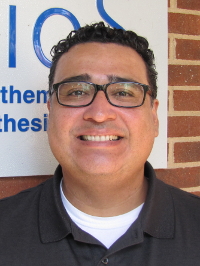 Time/Date: 3:30 p.m. Tuesday, November 27
Time/Date: 3:30 p.m. Tuesday, November 27Location: Hallam Auditorium, Room 206, Claxton Building, 1122 Volunteer Blvd.
Speaker: Luis Melara, Mathematics, Shippensburg Univ.; Visiting Scholar, NIMBioS and Mathematics, Univ. of Tennessee.
Topic: Optimal Control of Treatments for Retinitis Pigmentosa
Abstract: Retinitis pigmentosa (RP) is a degenerative eye disease affecting millions of people worldwide. This presentation will discuss two treatments for RP: Rod-derived Cone Viability Factor (RdCVF) and Mesencephalic-Astrocyte-derived-Neurotrophic Factor (MANF). Both treatments rescue photoreceptors in the eye. We model the RdCVF and MANF treatments by mathematically representing them as optimal control problems. We also present a preliminary optimal control model for mixed treatments of RP developed from previous work. Numerical results are presented and discussed. Click here for more information. Seminar flyer (pdf).
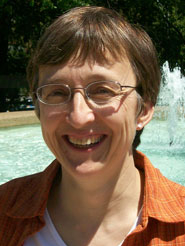 Time/Date: 3:30 Monday, November 12
Time/Date: 3:30 Monday, November 12Location: Hallam Auditorium, Room 206, Claxton Building, 1122 Volunteer Blvd.
Speaker: Aleydis Van de Moortel, Classics, Univ. of Tennessee, Knoxville; DySoC
Topic: Understanding the rise and decline of complex society at prehistoric Mitrou, Greece, through practice theory and human agency
Abstract: The 2004-2008 archaeological excavations carried out at the prehistoric settlement of Mitrou, central Greece, by a team from UT and the Greek Archaeological Service under co-directorship of the speaker, have led to the identification of a sequence of more than 60 occupational levels, spanning a period from the Early Bronze Age to the Early Iron Age (ca. 2400 - 900 BCE). Such a long, detailed, and uninterrupted sequence is unique in Greece and makes Mitrou an ideal site for studying major societal changes. Our work is contributing to the understanding of cycles of civilization, from the Early Bronze IIB Corridor House civilization to the simpler societies of the Early Bronze III and Middle Bronze periods; the rise of a visible political elite in the early part of the Late Bronze Age; the subjugation of Mitrou by an outside (palatial) power in Late Bronze IIIA; the revival of the settlement after the fall of the Mycenaean palaces; and the reversion to a simpler society at the end of the Late Bronze Age and in the Early Iron Age. In the absence of written records, interpretations of the dynamics of social complexity at Mitrou are based on physical remains. Practice theory and human agency have proven to be particularly fruitful venues, leading us to identify at one time a drastic change in social practices indicative of a population shift, and at other times instances when individuals subverted existing practices to construct a new ideology of power and elevate their own social status. Click here for more information. Seminar flyer (pdf).
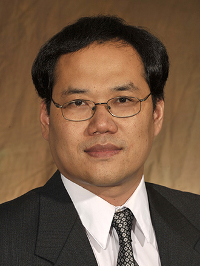 Time/Date: 12:15-1:15 p.m. Friday, November 2
Time/Date: 12:15-1:15 p.m. Friday, November 2Location: Hallam Auditorium, Room 206, Claxton Building, 1122 Volunteer Blvd.
Speaker: Xiaopeng Zhao, Mechanical, Aerospace, and Biomedical Engineering, Univ. of Tennessee, Knoxville
Topic: Planar control of a quadcopter using Brain Machine Interface
Abstract: Brain Machine interface (BMI) enables promising applications in neuroprosthesis and neurorehabilitation by controlling robotic devices based on the subject's intentions. In contrast to earlier techniques using sensorimotor rhythms, the method here intends to directly extract information of imagined body kinematics and thus can significantly reduce training time. We developed a BMI platform that controls a quadcopter using noninvasively acquired brain signals. Scalp electroencephalogram (EEG) signals of a user's imaginary movements are collected in real-time and translated by a computer to control a quadcopter along a designated path in a two-dimensional space. The BMI paradigm may be utilized in controlling neuroprosthetic limbs and neurorehabilitation devices. Click here for more information. Seminar flyer
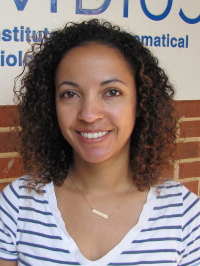 Time/Date: 3:30 p.m. Tuesday, October 30
Time/Date: 3:30 p.m. Tuesday, October 30Location: Hallam Auditorium, Room 206, Claxton Building, 1122 Volunteer Blvd.
Speaker: Olivia Prosper, Mathematics, Univ. of Kentucky
Topic: Spatial heterogeneity, host movement, and the transmission of mosquito-borne disease
Abstract: The Ross-Macdonald framework, a suite of mathematical models for the transmission of mosquito-borne disease, made numerous simplifying assumptions including that transmission occurs in a homogeneous environment. Despite these assumptions, this modeling framework has been invaluable to the study of vector-borne disease and to informing public health policy. In recent years, more attention has been paid to the role of human movement in regions with spatially heterogeneous disease transmission. In this talk, I will introduce metapopulation frameworks for vector-borne disease, based on the Ross-Macdonald model, in which human movement connects discrete populations with different levels of malaria transmission. I will discuss properties of this model, compare these properties to the homogeneous case, and will discuss the implications for malaria control. Finally, I will present an approach for identifying the appropriate network structure for the metapopulation model, using either mobile phone or geographical data. Click here for more information. Seminar flyer (pdf).
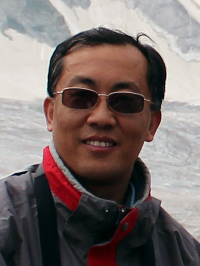 Time/Date: 12:15-1:15 p.m. Friday, October 19
Time/Date: 12:15-1:15 p.m. Friday, October 19Location: Hallam Auditorium, Room 206, Claxton Building, 1122 Volunteer Blvd.
Speaker: Yingkui Li, Geography, UTK
Topic: Mapping topography and surface processes using unmanned aircraft system and structure from motion
Abstract: The recent development in unmanned aircraft systems (UAS) and structure from motion (SFM) provides a rapid, efficient, and low-cost means to map detailed topography and quantify earth surface processes in a much finer (up to cm-level) resolution. This presentation introduces the recent teaching and research activities associated with UAS and SFM in the Department of Geography, including the accuracy assessment of UAS-mapped topography based on the comparison with the topography generated using the terrestrial laser scanner, and the pros and cons of various software packages and web services in mapping various terrain features (such as ground surface, vegetation, and buildings), and the potential of using UAS and SFM to map the extent and extract the 3-D characteristics of Kudzu. Click here for more information. Seminar flyer
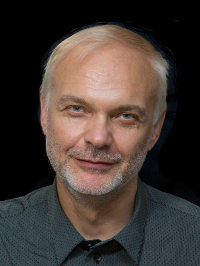 Time/Date: 3:30 p.m. Monday, October 15
Time/Date: 3:30 p.m. Monday, October 15Location: Hallam Auditorium, Room 206, Claxton Building, 1122 Volunteer Blvd.
Speaker: Sergey Gavrilets, EEB, Mathematics, NIMBioS, UTK; DySoC Director; Anthropology, Oxford Univ.
Topic: Modeling the evolutionary origins and dynamics of social complexity
Abstract: It is now well recognized that understanding modern human behavior, psychology, culture, and certain economic and political processes is hardly possible without also considering factors and processes that were shaping our recent evolution. Deciphering the problems of human origins and subsequent social and cultural evolution requires a concerted effort of researchers from a diverse set of disciplines including biology, anthropology, psychology, economics, and history as well as mathematics and computational science. If we, as scientists, are successful in this endeavor, the societal impact will be enormous. I will illustrate some of my recent modeling work in this area. I will consider the collective action problem in heterogeneous groups, effects of identify fusion on self-sacrifice, the evolution of social norm internalization, and the joint dynamics of power inequality and cooperation. Click here for more information. Seminar flyer (pdf).
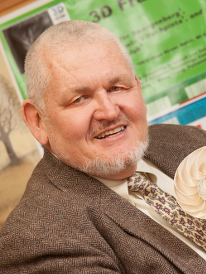 Time/Date: 3:30 p.m. Tuesday, October 2
Time/Date: 3:30 p.m. Tuesday, October 2Location: Hallam Auditorium, Room 206, Claxton Building, 1122 Volunteer Blvd.
Speaker: John R. Jungck, Director, Interdisciplinary Science Learning Center; Mathematics; Computational Biology and Bioinformatics, Univ. of Delaware
Topic: Exploring nanobiological structures with 3D nanotomography, 4D printing via self-assembly, and graph theory
Abstract: We have been doing 3D X-Ray nanotomography of radiolarian tests and studying them geometrically and topologically. Also, we have been 4D printing via self-assembly icosahedral viral capsid models. I will bring along a variety of models that we have built to illustrate our work. Click here for more information. Seminar flyer (pdf).
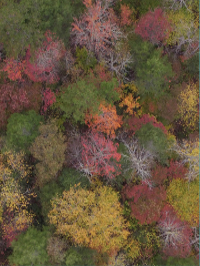 SAL at NIMBioS Brown Bag Seminar Series, UAS@UTK: Drones for Research
SAL at NIMBioS Brown Bag Seminar Series, UAS@UTK: Drones for Research
Time/Date: 12:15 p.m. Friday, September 14, 2018
Location: Hallam Auditorium, Room 206, Claxton Building, 1122 Volunteer Blvd.
Speaker: Michael Buban, Air Resources Laboratory, Atmospheric Turbulence & Diffusion Division, NOAA
Topic: NOAA UAS Research and Technology Program: Moving research UAS platforms into operations
Abstract: NOAA's Atmospheric Turbulence and Diffusion Division (NOAA/ATDD) has been testing small unmanned aircraft system (sUAS) platforms and instrumentation to make high-resolution measurements of thermodynamic properties of the Earth's lower boundary layer and surface for the past four years. The use of sUAS for atmospheric research provides unprecedented access to a heretofore undersampled region of the lower boundary layer. Flights on a routine basis over a variety of land-surface types in various seasons will allow improvements in weather forecast models. This presentation will cover NOAA/ATDD's most recent developments in evaluating meteorological sensors for suitability for use on its small UAS, calibrating the sensors to NIST-traceable standards, validating the sensors performance against other measurement systems, and assessing the value of small UAS airborne systems for monitoring weather conditions on a routine basis. Click here for more information.
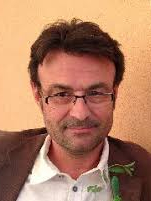 Time/Date: 3:30 p.m. Tuesday, September 18
Time/Date: 3:30 p.m. Tuesday, September 18Location: Hallam Auditorium, Room 206, Claxton Building, 1122 Volunteer Blvd.
Speaker: Luc Doyen, Director of Research CNRS, GREThA, Univ. of Bordeaux, France
Topic: Tragedy of Open Ecosystems
Abstract: This presentation investigates the role played by cooperation for the sustainable harvesting of an ecosystem. To achieve this, a bio-economic model based on multi-species dynamics with interspecific relationships and multi-agent catches is considered. A comparison between the non-cooperative and cooperative optimal strategies is carried out. Revisiting the Tragedy of Open Access and over-exploitation issues, it is first proved analytically how harvesting pressure is larger in the non-cooperative case for every species. Then it is examined to what extent gains from cooperation can also be derived for the state of the ecosystem. It turns out that cooperation clearly promotes the conservation of every species when the number of agents is high. When the number of agents remains limited, results are more complicated, especially if a species-by-species viewpoint is adopted. However, we identify two metrics involving the state of every species and accounting for their ecological interactions which exhibit gains from cooperation at the ecosystem scale in the general case. Numerical examples illustrate the mathematical findings. Click here for more information. Seminar flyer (pdf).
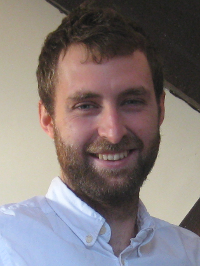 Time/Date: 3:30 Monday, September 24
Time/Date: 3:30 Monday, September 24Location: Hallam Auditorium, Room 206, Claxton Building, 1122 Volunteer Blvd.
Speaker: Damian Ruck, Anthropology, Univ. of Tennessee, Knoxville; Center for the Dynamics of Social Complexity (DySoC)
Topic: Cultural prerequisites for democracy and economic development
Abstract: The World Values Survey (WVS) quantifies the cultural values of 109 nations that represent 95% of the world's population on all six inhabited continents. Using unsupervised statistical methods, we present two orthogonal cultural components (Openness and Secular-Rationality) that underlie these data. Using a multilevel time series model, we show that Openness and Secular-Rationality must generally be infused into the population of a country before it becomes economically developed. Moreover, these cultural values not only also predict future levels of democracy, but also predict future democratic stability. Click here for more information. Seminar flyer (pdf).
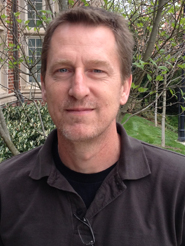 Time/Date: 3:30 Monday, August 27
Time/Date: 3:30 Monday, August 27Location: Hallam Auditorium, Room 206, Claxton Building, 1122 Volunteer Blvd.
Speaker: Todd Freeberg, Psychology, EEB, Univ. of Tennessee, Knoxville; Center for the Dynamics of Social Complexity (DySoC)
Topic: Songbird social psychology: Flock complexity affects Carolina chickadee behavior
Abstract: We have known for decades that animal behavior is influenced by the genetic and developmental backgrounds of individuals. In human behavior, it is also clear that the immediate social context of an individual powerfully influences her or his behavior. It is becoming increasingly clear that social context also plays an important role in non-human animal behavior. This presentation will outline a few of the experiments we have conducted recently on the vocal and problem-solving behavior of Carolina chickadees, a small songbird common to the southeastern United States. We have found that chickadee flock size and composition influence the complexity and use of calls by individuals, and also their ability to solve novel foraging problems. Our work provides support to the hypothesis that social complexity drives communicative complexity and may drive social intelligence. Click here for more information. Seminar flyer (pdf).
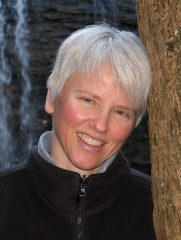 Time/Date: 3:30 p.m. Tuesday, September 4
Time/Date: 3:30 p.m. Tuesday, September 4Location: Hallam Auditorium, Room 206, Claxton Building, 1122 Volunteer Blvd.
Speaker: Shandelle M. Henson, Mathematics, Biology, Andrews Univ., Berrien Springs, MI; Editor-in-Chief, Natural Resource Modeling
Topic: Climate change and tipping points for seabird colonies in the Pacific Northwest
Abstract: Changes in sea surface temperatures in the Pacific Northwest are associated with changes in reproductive and feeding tactics in colonial seabirds. Warm years in the El Niño–Southern Oscillation are associated with short-term "lifeboat" tactics such as egg cannibalism that are not sustainable over the long term. Mathematical models suggest that prolonged rises in sea surface temperature can create tipping points that allow colony collapse. Click here for more information. Seminar flyer (pdf).
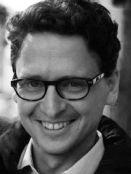 Time/Date: 3:30 p.m. Monday, April 16
Time/Date: 3:30 p.m. Monday, April 16Location: Hallam Auditorium, Room 206, Claxton Building, 1122 Volunteer Blvd.
Speaker: Garriy Shteynberg, Psychology, Univ. of Tennessee, Knoxville; Center for the Dynamics of Social Complexity (DySoC)
Topic: Not by Imitation Alone: Collective Learning as a Psychological Foundation of Human Evolutionary Success
Abstract: Imitative learning, or learning from others, serves as a cornerstone of cognitive, biological and social science scholarship, as it grounds the continuity, diversity, and innovation inherent to humanity's cultural repertoire in the social learning capacities of individual humans. In contrast, collective learning, or learning with others, has received scant attention. Here we outline the theoretical and empirical case for the importance of collective learning in human cognition and action. We will posit that collective learning is a social learning capacity that facilitates sophisticated forms of collective cognition, which in turn enable more successful collective action. We (1) discuss the development and nature of collective learning, (2) distinguish collective learning from that of imitative learning, (3) address the implications of learning collectively to forms of collective cognition such as shared deliberation, shared memory, and shared motivation, (4) posit that collective learning contributes to cumulative cultural evolution, (5) argue that collective learning is part and parcel of other social cognitive human capacities such as spontaneous teaching, egalitarianism, and theory of mind, and finally, (6) speculate on the implications of collective learning capacity in a socially networked world. Click here for more information. Seminar flyer (pdf)
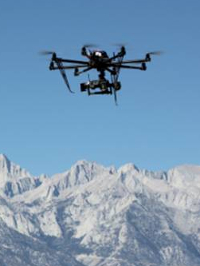 SAL at NIMBioS Brown Bag Seminar Series, UAS@UTK: Drones for Research
SAL at NIMBioS Brown Bag Seminar Series, UAS@UTK: Drones for Research
Time/Date: 12:15 p.m. Friday, April 13
Location: Hallam Auditorium, Room 206, Claxton Building, 1122 Volunteer Blvd.
Speaker: Jeff Moersch, Earth & Planetary Sciences, Univ. of Tennessee, Knoxville
Topic: Unmanned aerial vehicle studies of terrestrial analogs for Mars
Abstract: Terrestrial analogs are places on Earth that share one or more important geologic or astrobiologic characteristics with features found on other planets. In-depth studies of such relatively-accessible locations are useful because they provide a better understanding of the processes that may have been active on other planets, and also because they help us refine our exploration strategies for future planetary missions. Dr. Moersch has worked on terrestrial analog studies related to Mars for the past 20 years using traditional geologic field techniques and recently has added the use of unmanned aerial vehicles (UAVs, or "drones") to his approach. In this talk, he will discuss the added value that UAVs bring to this type of work, with examples from terrestrial analog sites in the high Arctic, the Atacama Desert and Altiplano of Chile, the Mojave Desert, and Iceland. Click here for more information. Seminar flyer (pdf)
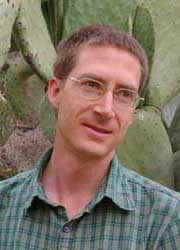 Time/Date: 3:30 p.m. Tuesday, April 10
Time/Date: 3:30 p.m. Tuesday, April 10Location: Hallam Auditorium, Room 206, Claxton Building, 1122 Volunteer Blvd.
Speaker: Patrick Shipman, Mathematics, Colorado State Univ.
Topic: Counterdiffusion in biological and atmospheric systems
Abstract: In topochemically organized, nanoparticulate experimental systems, vapor diffuses and convects to form spatially defined reaction zones. In these zones, a complex sequence of catalyzed proton-transfer, nucleation, growth, aggregation, hydration, charging processes, and turbulence produce rings, tubes, spirals, pulsing crystals, oscillating fronts and patterns such as Liesegang rings. We call these beautiful 3-dimensional structures microtornadoes, microstalagtites, and microhurricanes and make progress towards understanding the mechanisms of their formation with the aid of mathematical models. This analysis carries over to the study of similar structures in protein crystallization experiments and the formation of periodic structures in plants. Click here for more information. Seminar flyer (pdf)
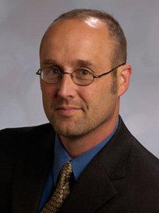 Time/Date: 3:30 p.m. Monday, March 19
Time/Date: 3:30 p.m. Monday, March 19Location: Hallam Auditorium, Room 206, Claxton Building, 1122 Volunteer Blvd.
Speaker: Brandon Prins, Political Science, Univ. of Tennessee, Knoxville; Center for the Dynamics of Social Complexity (DySoC)
Topic: Pirate lands: Governance and maritime piracy
Abstract: With piracy in the Greater Gulf of Aden seemingly eradicated, some analysts suggest that attacks against shipping no longer remain a salient global security concern. But recent increases off the coast of Nigeria and around the Straits of Malacca confirm that the threat has not been entirely eliminated. While structural (country-level) indicators of poverty and institutional fragility correlate with piracy, local conditions on land proximate to anchorages and shipping lanes where incidents occur will likely provide additional leverage in explaining where pirates locate and why piracy endures. Existing research also suggests piracy may be connected to armed insurgency. As rebels seek resources to help fund their anti-state or separatist campaigns, piracy, like gemstones, oil, and narcotics, may serve as a means to pay fighters and purchase weapons. Spatially and temporally disaggregated analyses as well as the synthesis of research on civil war and maritime piracy will open up new lines of inquiry into the relationship between lootable resources and armed conflict. Click here for more information. Seminar flyer (pdf)
 Time/Date: 3:30 p.m. Wednesday, February 14
Time/Date: 3:30 p.m. Wednesday, February 14Location: Hallam Auditorium, Room 206, Claxton Building, 1122 Volunteer Blvd.
Speaker: Alex Bentley, Anthropology, Univ. of Tennessee, Knoxville; Center for the Dynamics of Social Complexity (DySoC)
Topic: The acceleration of cultural evolution
Abstract: For millennia, sociocultural complexity increased (and occasionally decreased) gradually over many human generations, as people inherited traditional knowledge within kin-based local communities. In these settings, where knowledge was shared within populations and across generations, selection was probably the key driver in norms of human adaptive behavior. In the 21st century, however, knowledge is transmitted across populations and within generations—and evolutionary patterns may resemble random drift more than selection in increasingly many settings. To span these different scales and modes of cultural evolution, different representations are useful, including fitness landscapes and a heuristic representing the transparency of payoffs in social learning. I will use these approaches to discuss how cultural evolution may have profoundly changed—from adaptive selection towards drift—from the ancient past to present-day. Click here for more information. Seminar flyer (pdf)
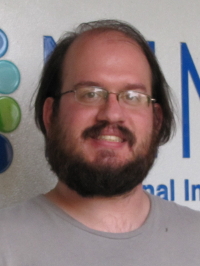 Time/Date: 3:30 p.m. Tuesday, January 23
Time/Date: 3:30 p.m. Tuesday, January 23Location: Hallam Auditorium, Room 206, Claxton Building, 1122 Volunteer Blvd.
Speaker: Nicholas Panchy, NIMBioS Postdoctoral Fellow
Topic: Modeling gene expression and regulation in response to light-dark signaling
Abstract: Although gene expression has been profiled in more than three thousand different species, the analysis of these data remains challenging in part because multiple signals effect gene regulation. In particular, endogenous (circadian) and exogenous (e.g., light-dark) cycles are prominent in biological systems, especially those that undergo photosynthesis. Using expression data from the model green algae Chlamydomonas reinhardtii, I found that half of the annotated genes in this algae are expressed cyclically in response to light-dark variation by using two different approaches to model cyclic expression. Among these light-dark genes, the timing of peak expression (phase) is both correlated with annotated gene function and evolutionarily constrained between duplicate pairs, indicating that this cyclic behavior is biologically significant. However, while I was able to identify cis-regulatory elements that were associated with different phases of light-dark expression, these cis-elements proved to be poor predictors of cyclic expression phase on their own, raising questions about the complexity of gene networks regulating the timing of expression. It was these questions that ultimately led to my current work studying the timing of events in cell differentiation and regulation of ribosomes by cyclic signals. Click here for more information. Seminar flyer (pdf)
NIMBioS
1122 Volunteer Blvd., Suite 106
University of Tennessee
Knoxville,
TN 37996-3410
PH: (865) 974-9334
FAX: (865) 974-9461
Contact NIMBioS


